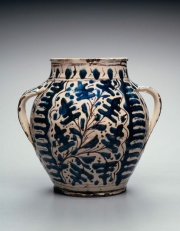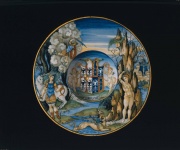Difference between revisions of "Majolica"
Jump to navigation
Jump to search
(username removed) |
(username removed) |
||
| Line 18: | Line 18: | ||
== Authority == | == Authority == | ||
| − | * ''Encyclopedia Britannica'', http://www.britannica.com Comment: majolica." | + | * ''Encyclopedia Britannica'', http://www.britannica.com Comment: majolica." Encyclopædia Britannica. 2005. Encyclopædia Britannica Premium Service 4 Feb. 2005 . |
* ''The Bullfinch Guide to Art History'', Shearer West (ed.), Bullfinch Press, Boston, 1996 | * ''The Bullfinch Guide to Art History'', Shearer West (ed.), Bullfinch Press, Boston, 1996 | ||
Revision as of 06:31, 24 July 2013
Description
A type of tin-glazed earthenware first produced on the island of Majorca. The technique was transferred to Italy in the 12th century and later spread slowly throughout Europe. Now, even though several similar methods are used elsewhere in Europe (faience, delftware), the term 'majolica' refers only to the tin-glazed pottery made in Italy. The white majolica tin glazes were decorated in blue (cobalt), yellow (antimony), red (iron), green (copper), and purple (manganese).
Synonyms and Related Terms
maiolica
Additional Images
Authority
- Encyclopedia Britannica, http://www.britannica.com Comment: majolica." Encyclopædia Britannica. 2005. Encyclopædia Britannica Premium Service 4 Feb. 2005 .
- The Bullfinch Guide to Art History, Shearer West (ed.), Bullfinch Press, Boston, 1996


